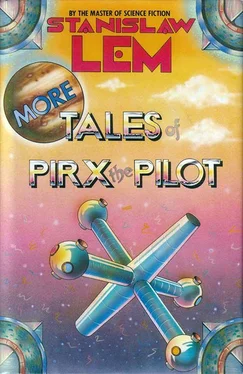What made him do it? Maybe it was wounded pride—at having given me more credit than I deserved. It certainly wasn’t fear; he wasn’t afraid of clearing the Division, no matter how suicidal the risk. Nor was he relying on luck. That Quine managed to squeak us through—now, that was luck!
If he’d suppressed his desire to get even for his having mistaken my ignorance for alertness, he wouldn’t have risked much. I’d have won, simply; Calder’s performance, his act of insubordination, would have vindicated me. But that’s exactly what he couldn’t stomach. Anything was better than that.
Oddly enough, even though his behavior is perfectly clear to me now, I’m still puzzled by my own. I can reconstruct his every move logically, but I still can’t explain my silence. To say I was merely undecided would be, well, fibbing. What really came to my rescue up there? Intuition? A hunch? No, the emergency was just too pat; more, it was dirty. I wanted no part of such a game or of such a partner, which is what Calder would have become the moment I upped the ante by issuing an order—the moment I acknowledged it, in other words. I couldn’t lower myself to do that, any more than I could order a retreat. Running might have been more expedient, but how could I justify it when all my countermoves had been dictated by some fuzzy notions of fair play—notions totally untranslatable into concrete astronautical terms. I could just picture myself before some Earthly review board: “The mission was technically feasible, but I suspected my chief pilot of wanting to commit sabotage to help me discredit certain members of the crew…” They’d have taken me for a raving idiot.
So I wavered—from confusion to desperation, and even to revulsion—and, at the same time, through my silence, I gave him what I thought was a chance. A chance to dispel any suspicion of sabotage, to prove his loyalty by turning to me for guidance. That’s what a human would have done, but Calder chose the cleaner, more elegant way: I was to be my own executioner, without any prompting from him. I was supposed to force his hand—against his better judgment, so to speak, against his will. But I kept silent. In other words, we were saved and he was doomed by my lack of resoluteness, by that same bumbling human decency he had held in such bitter contempt.
ANANKE
Translated by Louis Iribarne with the assistance of Magdalena Majcherczyk
Something jarred him out of his sleep, into the dark. Left behind—where?—was a reddish, smoky wreath—a city? a fire?—and an enemy, a chase, an outcropping—the other man? Though resigned to failure, he kept dogging the receding recollection, consoling himself with the customary explanation that a dream can be stronger, more compelling than reality itself, purged of words but, for all its whimsicality, governed by a law that only there, in the nightmare, takes on the force of the real. He didn’t know where he was, could recall nothing. One probe of the hand would tell him, but he rankled at his memory’s inertia, coaxed it, cajoled it to bear witness. He cheated; lying perfectly still, he tried to get his bearings from the consistency of the bedding. Not a bunk, that was for sure. Flash: a landing, sparks on a desert floor, the disk of a seemingly bogus, aggrandized Moon; craters, but caught in a dust storm, the currents of a dirty, rusty gale; the square of the cosmodrome’s towers.
Mars.
Still flat on his back, he pondered, this time objectively, the reason for his awakening. He trusted his own body; it wouldn’t have been roused for nothing. OK, the landing had been a tough one, and he was all in after two round-the-clock watches—after Terman broke his arm when the automatic sequencer fired and smacked him against a bulkhead. After eleven years of flying, to bounce off the ceiling during a burn—what a wimp! That’d mean visits to the hospital. Was that the reason? No.
One by one he started recalling yesterday’s events. Starting with the landing. Set down in a windstorm. Atmosphere as good as nil—but with a wind at two hundred sixty kilometers, per hour, try staying on your feet in that miserable gravity. No friction under your soles; to walk, you have to dig your shoes into the sand, sink in it up to your ankles. And that dust, scraping your g-suit with an icy hiss, seeping into every fold, not exactly red, not rust-colored, either; just ordinary sand, only fine-grained, the product of a few billion years of grinding. There was no Port Control office here, because there was no port in the normal sense. Now in its second year, the Mars project was still in a provisional state; anything they erected was immediately inundated with dust—hotels, hostels, whatever. Huge oxygen domes, each the size of ten hangars, squatted under an umbrella of radial steel cables anchored to concrete blocks barely visible from beyond the dunes. Quonset huts, corrugated sheet metal, piles and piles of crates, containers, tanks, bottles, cases, sacks: a city of cargo dumped from a conveyor belt.
The only sealed, halfway decently furnished place was flight control, situated beyond the “bell,” three kilometers away from the cosmodrome where he was now lying in the dark, on a bed belonging to Seyn, the controller on duty.
He sat up and groped for his slippers with his bare foot. He always packed them, just as he always changed before going to bed and felt lousy if he didn’t shave and wash. He couldn’t remember the layout of the room, so, to play it safe, he got up cautiously; too easy to bash your skull, what with the present shortage of materials (the project was all abuzz with the new austerity drive). It upset him that he couldn’t remember where the light switches were. A blind rat. He fumbled around; instead of the switch he touched a cold knob, pulled it. Something clicked and an iris shutter opened with a faint crunch. A dirty, hollow dawn. Standing before the window, which resembled more a ship’s porthole, Pirx felt the stubble on his cheek, scowled, sighed: everything seemed out of whack, and for no apparent reason. If he’d thought about it, he might have acknowledged the reason: he hated Mars.
It was a purely personal thing; nobody knew his true feelings, and nobody cared. Mars, the embodiment of spent illusions—scoffed, ridiculed, but precious. Any other run would have been better. All that past glamorizing of the project was sheer hokum; the chances for colonization a fiction. Oh, Mars had fooled them all; besides, it had been fooling people for a hundred-odd years. The canals. One of the most beautiful, most uncanny episodes in the whole of astronomy. The rusty planet—a desert. The whitecaps of polar snows, last reservoirs of water. A perfectly geometric net as if diamond-etched in glass, running from the poles to the equator: evidence of a contest between reason and nullity, a powerful irrigation system watering millions of desert acres. But of course: come spring, and the coloring of the deserts changed, darkening with the budding vegetation, and in orderly fashion, from the equator to the pole.
What bull! Not a trace of any canals. Vegetation? Those mysterious mosses, lichens protected against frost and windstorms? Polymerized compound carbon monoxides, covering the crust and evaporating when the nightmarish frost turned merely mean. Snow caps? Ordinary solidified C0 2. No water, no oxygen, no life—only rugged craters, dust-eaten rock buttes, tedious plains, a lifeless, flat, and grizzly landscape under a pale, rusty-dun sky. No real clouds, only a blurry haze, a pall, the gloom of a severe thunderstorm. Yet enough atmospheric electricity to last a lifetime, and then some.
What was that humming sound? A signal? No, just the vibrations of the steel cables over the nearest “bubble.” In the dirty light (even the toughest windowpane soon succumbed to the wind-borne sand, which left the plastic dwelling domes looking as if blinded by cataracts), he switched on the bulb above the washbasin and began to shave. As he stretched his cheek muscles taut, he had a sudden silly intuition: Mars was a fraud.
Читать дальше












